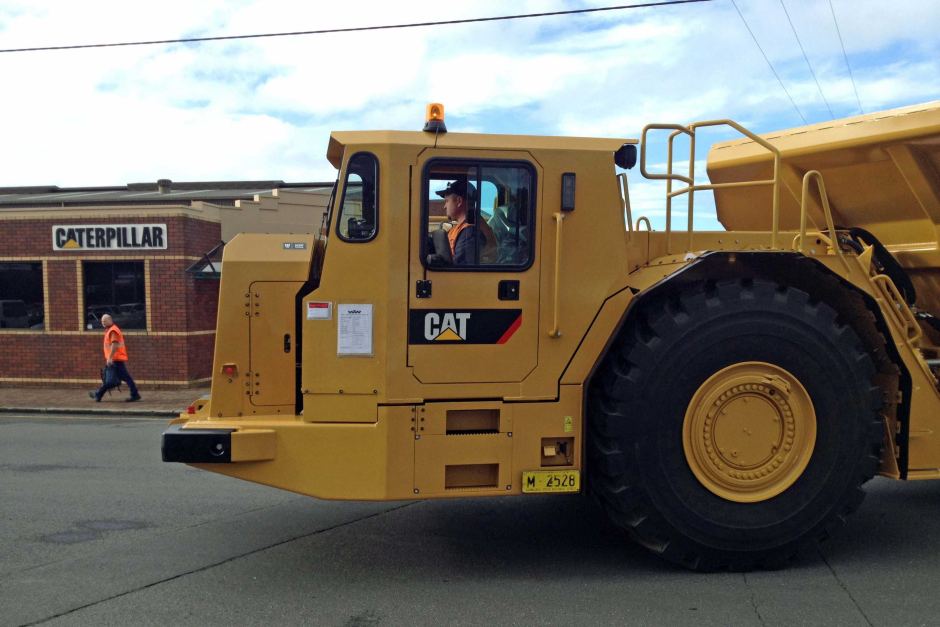Category: Stockmarket / Currency / Futures / Markets / Mining Industry / Manufacturing
US shares fall as oil prices ease, Caterpillar stomped
Wednesday, 26 Oct 2016 05:38:03 | Sue Lannin

US heavy machinery giant Caterpillar was hit on falling profit and lower sales estimates. (ABC: Claire Todd)
US stocks fell from a two-week high after disappointing financial results by big companies and a drop in consumer confidence.
Markets at 9:00am (AEDT):
- ASX SPI 200 futures -0.2pc to 5,422
- AUD: 76.44 US cents, 62.74 British pence, 79.67 Japanese yen, 70.2 euro cents, $NZ1.067
- US: S&P 500 -0.4pc to 2,143, Dow Jones -0.3pc to 18,169, Nasdaq -0.4pc to 4,891
- Europe: Euro Stoxx -0.3pc to 332, FTSE +0.5pc to 7,018, DAX -4pts to 10,757
- Commodities: Gold +0.1pc to $US1,275/ounce, Brent crude oil -2.3pc to $US50.26/barrel, iron ore $US61.60/tonne
Oil prices slipped further on speculation that Russia will not join the Organisation of Petroleum Exporting Countries (OPEC) in curbing production.
Shares in heavy machinery maker, Caterpillar, lost 1.75 per cent to $US84.48 after its quarterly profit fell by nearly half to $US283 million.
It also lowered sales estimates because of the weaker global economy and oversupply of second hand equipment.
The firm's chief executive Doug Oberhelman will step down from the role at the end of this year to be replaced by 35-year company veteran Jim Umpleby.
Shares in Post-it note maker 3M dropped after it cut its annual earnings forecast for the second time.
General Motors made record revenue for the third quarter and more than doubled quarterly net profit to $US2.8 billion thanks to higher car production, but its shares fell 4 per cent to $US31.60 because of investor concerns about future growth.
However, shares in toiletries and household goods maker Proctor & Gamble bucked the trend and rose to $US87.38 as the company's results were better than predicted.
Sales of products such as toothbrushes and deodorants increased.
US consumer confidence fell more than expected in October according to the Conference Board.
European markets down, BoE plays down rate cut chances
In Europe the major markets were also mainly weaker, with the CAC 40 in Paris losing ground and the DAX in Germany down slightly.
But the FTSE 100 in London gained half a per cent after global mining giant Anglo American gave a production update and its shares rose 4.6 per cent.
The pound fell to its lowest level since the "flash crash" earlier this month, but then regained some ground after Bank of England governor Mark Carney told a parliamentary committee there was less chance of another cut in official UK interest rates this year.
"There are limits to the willingness of the Monetary Policy Committee to look through an overshoot of inflation," he said.
His comments saw the greenback come off the highest level in nearly eight months.
In futures trade, the ASX SPI 200 lost ground indicating a weak start to Australian trade today.
Oil prices fell after Russia said that production cuts were not an option.
That is after Iraq said it could not afford to lower output.
Energy companies were little affected because of good profit results from oil and gas drilling company Baker Hughes and oil refiner Valero.
Spot gold rose on expectations of higher demand from India because of the Diwali religious festival.
Benchmark iron ore prices in Tianjin in China gained to $US61.60 a tonne after surveys showed that global manufacturing is expanding.
Australian dollar rises ahead of inflation data
The Australian dollar rose nearly half a cent against the greenback overnight, ahead of the release of the September quarter inflation figures which are predicted to see consumer price rise slightly but still below the Reserve Bank's target.
In a note, ANZ economists said today's inflation data was being closely watched for its impact on the Australian dollar and the future direction of Australian interest rates.
"Today's Q3 Australian CPI data looms large in the mind of the market, with its result potentially changing the outlook for rates and FX," the analysts noted.
"While we expect a number that should keep markets steady at 0.4 per cent quarter-on-quarter and 1.5 per cent year-on-year, the risks on either side will bring in the debate of further rate cuts or the potential for the market to call the end of the cutting cycle."
They predict that an underlying inflation rate of 0.3 per cent for the September quarter could put cuts in official interest rates back on the table and see the Australian dollar fall.
But an increase in core inflation to 0.6 per cent for the quarter could push the Australian dollar above 77.20 US cents.
- About Us
- |
- Terms of Use
- |
-
 RSS
RSS - |
- Privacy Policy
- |
- Contact Us
- |
- Shanghai Call Center: 962288
- |
- Tip-off hotline: 52920043
- 沪ICP证:沪ICP备05050403号-1
- |
- 互联网新闻信息服务许可证:31120180004
- |
- 网络视听许可证:0909346
- |
- 广播电视节目制作许可证:沪字第354号
- |
- 增值电信业务经营许可证:沪B2-20120012
Copyright © 1999- Shanghai Daily. All rights reserved.Preferably viewed with Internet Explorer 8 or newer browsers.




 Send to Kindle
Send to Kindle